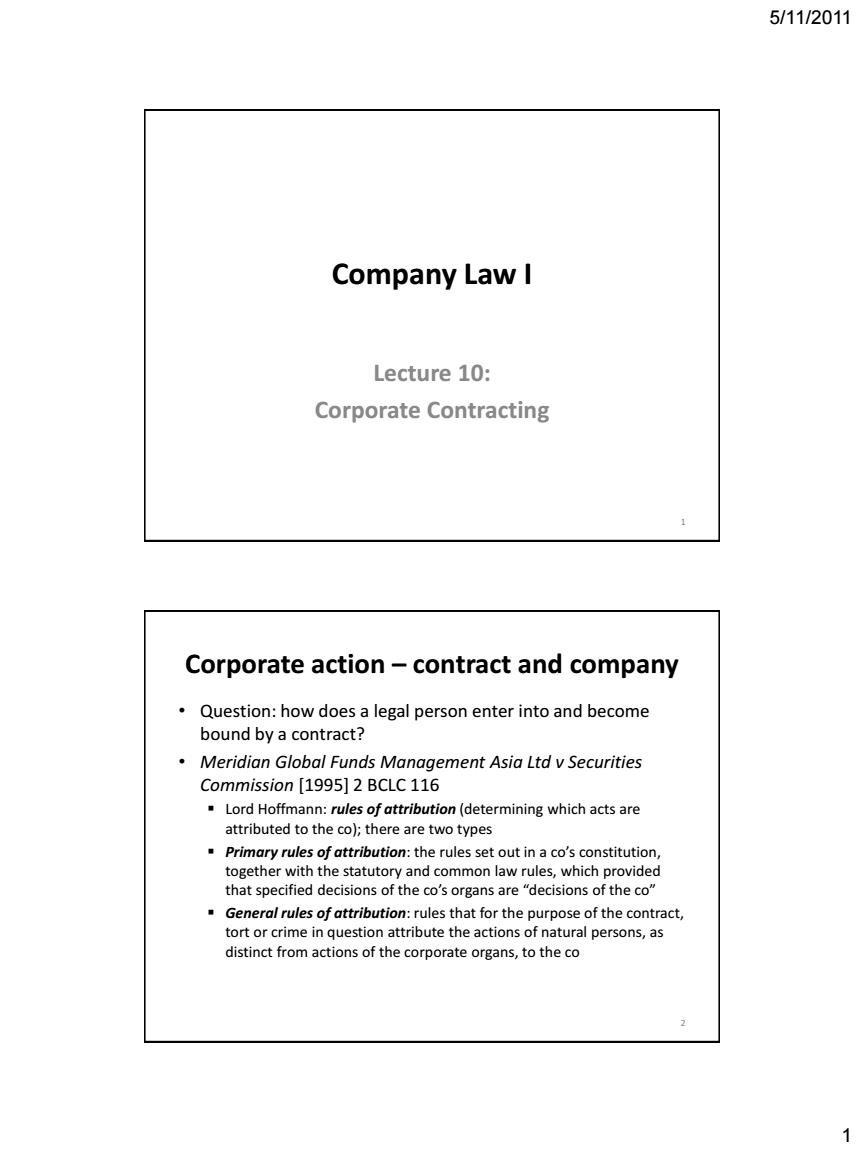
5/11/2011 Company Law I Lecture 10: Corporate Contracting Corporate action-contract and company Question:how does a legal person enter into and become bound by a contract? Meridian Global Funds Management Asia Ltd v Securities Commission [1995]2 BCLC 116 Lord Hoffmann:rules of attribution(determining which acts are attributed to the co);there are two types Primary rules of attribution:the rules set out in a co's constitution, together with the statutory and common law rules,which provided that specified decisions of the co's organs are"decisions of the co" General rules of attribution:rules that for the purpose of the contract, tort or crime in question attribute the actions of natural persons,as distinct from actions of the corporate organs,to the co 1
5/11/2011 1 1 Company Law I Lecture 10: Corporate Contracting 2 Corporate action – contract and company • Question: how does a legal person enter into and become bound by a contract? • Meridian Global Funds Management Asia Ltd v Securities Commission [1995] 2 BCLC 116 Lord Hoffmann: rules of attribution (determining which acts are attributed to the co); there are two types Primary rules of attribution: the rules set out in a co’s constitution, together with the statutory and common law rules, which provided that specified decisions of the co’s organs are “decisions of the co” General rules of attribution: rules that for the purpose of the contract, tort or crime in question attribute the actions of natural persons, as distinct from actions of the corporate organs, to the co
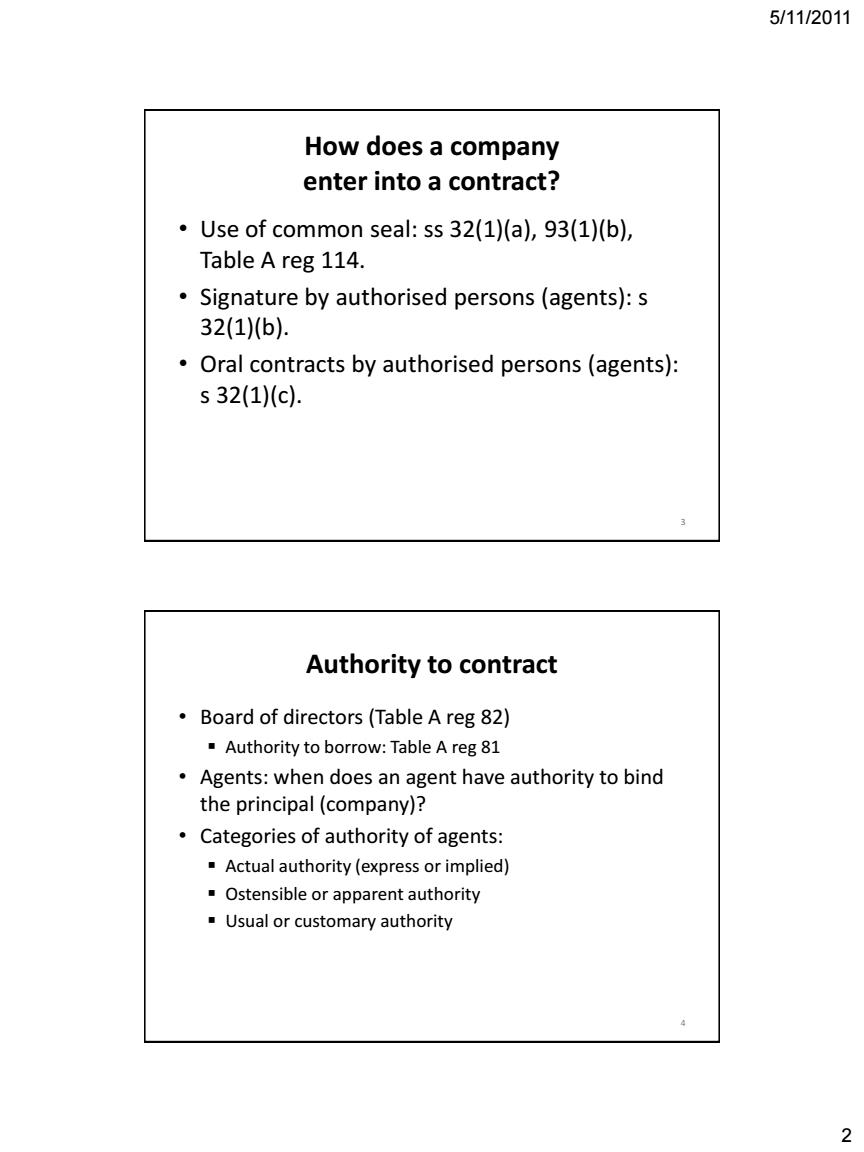
5/11/2011 How does a company enter into a contract? Use of common seal:ss 32(1)(a),93(1)(b), Table A reg 114. Signature by authorised persons (agents):s 32(1)(b). Oral contracts by authorised persons(agents): s32(1)(c. Authority to contract Board of directors(Table A reg 82) Authority to borrow:Table A reg 81 Agents:when does an agent have authority to bind the principal(company)? Categories of authority of agents: Actual authority(express or implied) Ostensible or apparent authority Usual or customary authority 2
5/11/2011 2 3 How does a company enter into a contract? • Use of common seal: ss 32(1)(a), 93(1)(b), Table A reg 114. • Signature by authorised persons (agents): s 32(1)(b). • Oral contracts by authorised persons (agents): s 32(1)(c). 4 Authority to contract • Board of directors (Table A reg 82) Authority to borrow: Table A reg 81 • Agents: when does an agent have authority to bind the principal (company)? • Categories of authority of agents: Actual authority (express or implied) Ostensible or apparent authority Usual or customary authority
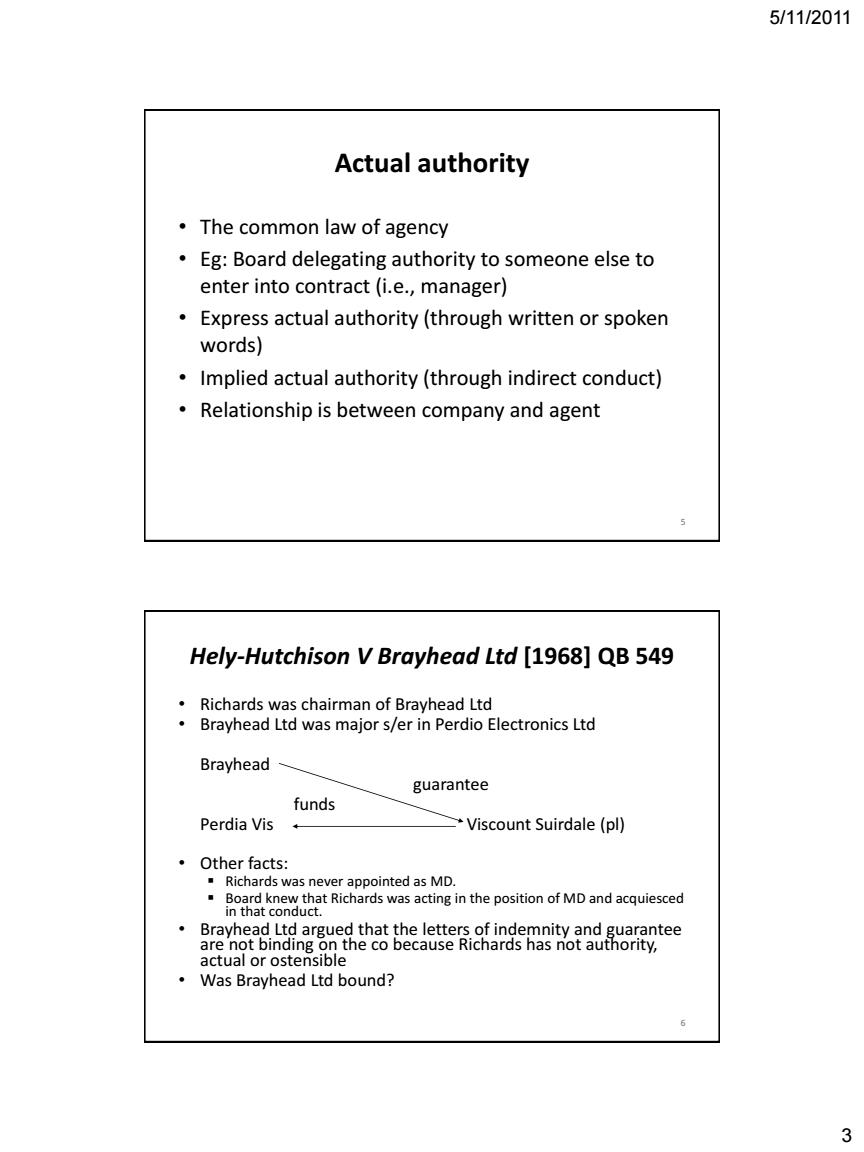
5/11/2011 Actual authority The common law of agency Eg:Board delegating authority to someone else to enter into contract(i.e.,manager) Express actual authority(through written or spoken words) Implied actual authority(through indirect conduct) Relationship is between company and agent Hely-Hutchison V Brayhead Ltd [1968]QB 549 Richards was chairman of Brayhead Ltd Brayhead Ltd was major s/er in Perdio Electronics Ltd Brayhead guarantee funds Perdia Vis -Viscount Suirdale(pl) ·Other facts: Richards was never appointed as MD. Board knew that Richards was acting in the position of MD and acquiesced in that conduct. Brayhead Ltd argued that the letters of indemnity and guarantee are not binding on the co because Richards has not authority, actual or ostensible Was Brayhead Ltd bound? 3
5/11/2011 3 5 Actual authority • The common law of agency • Eg: Board delegating authority to someone else to enter into contract (i.e., manager) • Express actual authority (through written or spoken words) • Implied actual authority (through indirect conduct) • Relationship is between company and agent 6 Hely-Hutchison V Brayhead Ltd [1968] QB 549 • Richards was chairman of Brayhead Ltd • Brayhead Ltd was major s/er in Perdio Electronics Ltd Brayhead guarantee funds Perdia Vis Viscount Suirdale (pl) • Other facts: Richards was never appointed as MD. Board knew that Richards was acting in the position of MD and acquiesced in that conduct. • Brayhead Ltd argued that the letters of indemnity and guarantee are not binding on the co because Richards has not authority, actual or ostensible • Was Brayhead Ltd bound?
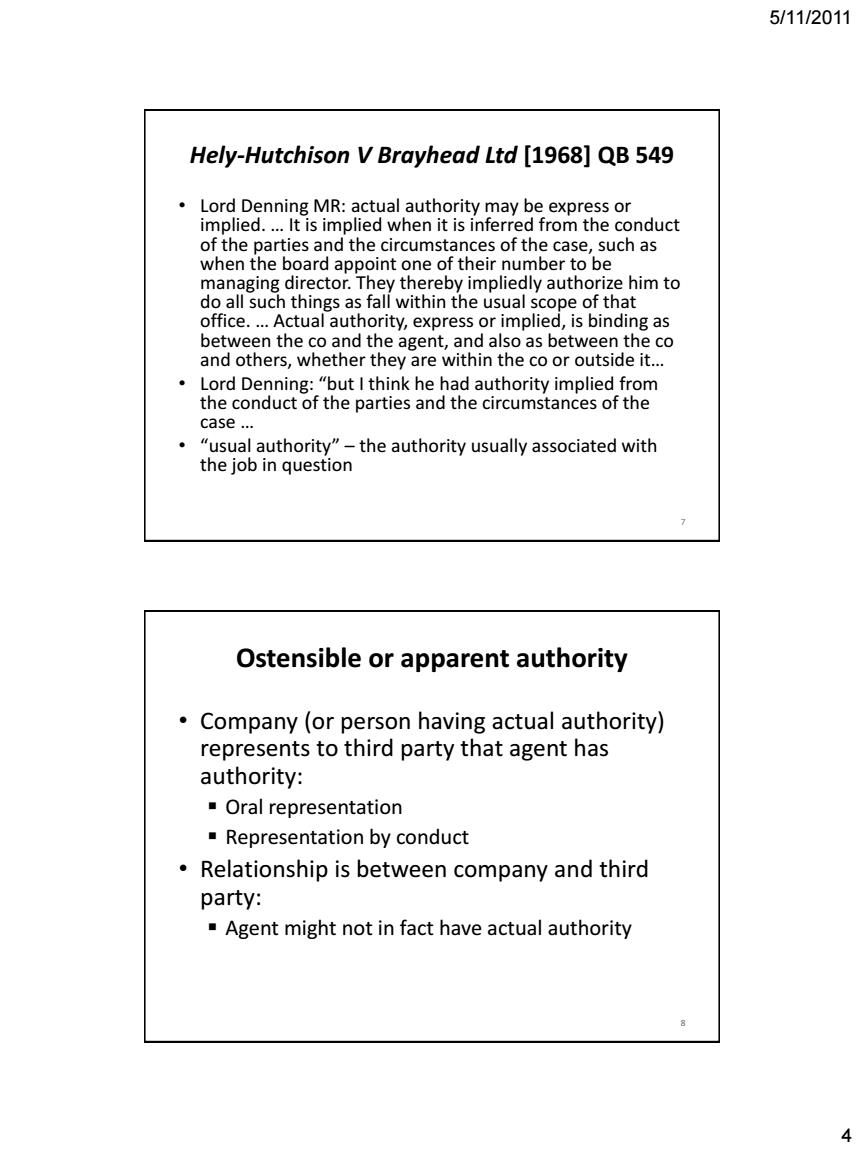
5/11/2011 Hely-Hutchison V Brayhead Ltd [1968]QB 549 Lord Denning MR:actual authority may be express or implied...It is implied when it is inferred from the conduct of the parties and the circumstances of the case,such as when the board appoint one of their number to be managing director.They thereby impliedly authorize him to do all such things as fall within the usual scope of that office....Actual authority,express or implied,is binding as between the co and the agent,and also as between the co and others,whether they are within the co or outside it... Lord Denning:"but I think he had authority implied from the conduct of the parties and the circumstances of the case... ·“usual authority”-the authority usually associated with the job in question Ostensible or apparent authority Company(or person having actual authority) represents to third party that agent has authority: Oral representation Representation by conduct Relationship is between company and third party: "Agent might not in fact have actual authority 4
5/11/2011 4 7 Hely-Hutchison V Brayhead Ltd [1968] QB 549 • Lord Denning MR: actual authority may be express or implied. … It is implied when it is inferred from the conduct of the parties and the circumstances of the case, such as when the board appoint one of their number to be managing director. They thereby impliedly authorize him to do all such things as fall within the usual scope of that office. … Actual authority, express or implied, is binding as between the co and the agent, and also as between the co and others, whether they are within the co or outside it… • Lord Denning: “but I think he had authority implied from the conduct of the parties and the circumstances of the case … • “usual authority” – the authority usually associated with the job in question 8 Ostensible or apparent authority • Company (or person having actual authority) represents to third party that agent has authority: Oral representation Representation by conduct • Relationship is between company and third party: Agent might not in fact have actual authority
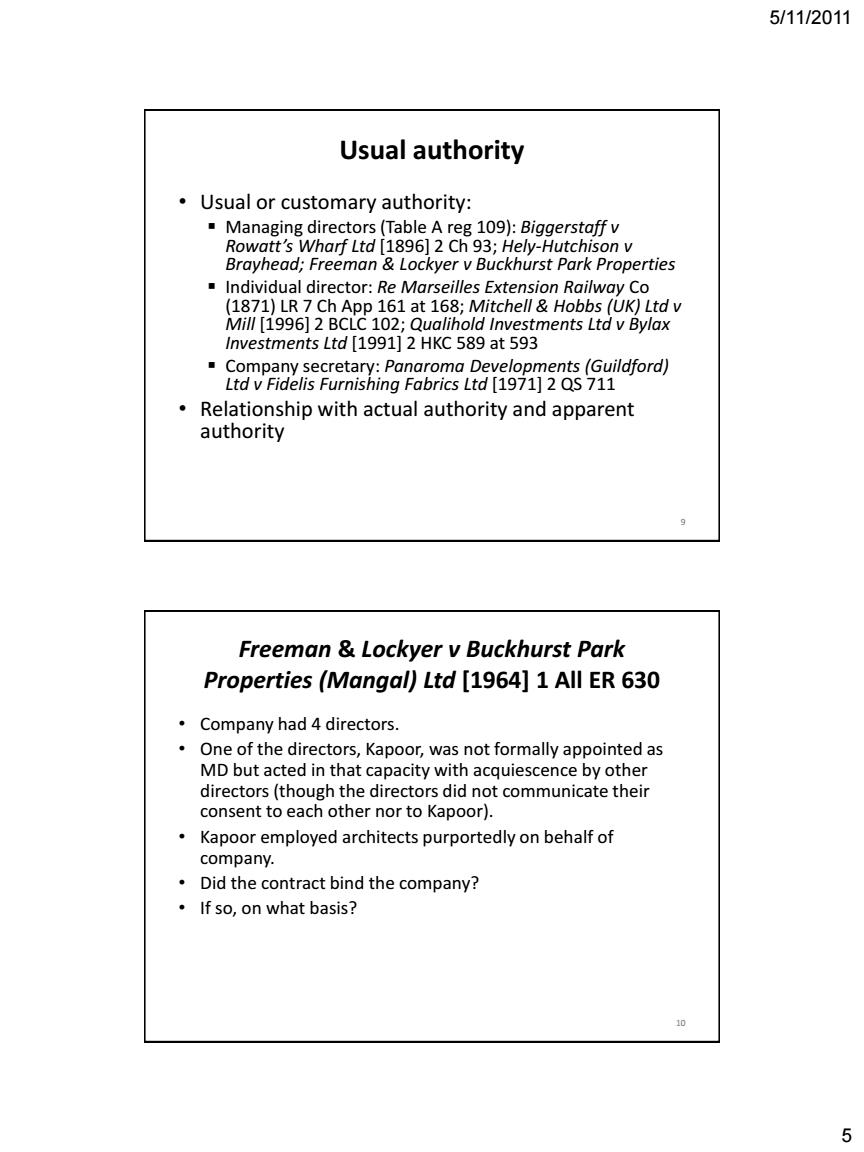
5/11/2011 Usual authority Usual or customary authority: Managing directors(Table A reg 109):Biggerstaffv Rowatt's Wharf Ltd [1896]2 Ch 93;Hely-Hutchison v Brayhead;Freeman Lockyer v Buckhurst Park Properties Individual director:Re Marseilles Extension Railway Co (1871)LR 7 Ch App 161 at 168;Mitchell Hobbs (UK)Ltd v Mill [1996]2 BCLC 102;Qualihold Investments Ltd v Bylax Investments Ltd [1991]2 HKC 589 at 593 Company secretary:Panaroma Developments(Guildford) Ltd v Fidelis Furnishing Fabrics Ltd [1971]2 QS 711 Relationship with actual authority and apparent authority Freeman Lockyer v Buckhurst Park Properties (Mangal)Ltd [1964]1 All ER 630 Company had 4 directors. One of the directors,Kapoor,was not formally appointed as MD but acted in that capacity with acquiescence by other directors(though the directors did not communicate their consent to each other nor to Kapoor). Kapoor employed architects purportedly on behalf of company. Did the contract bind the company? ·lfso,on what basis? 6
5/11/2011 5 9 Usual authority • Usual or customary authority: Managing directors (Table A reg 109): Biggerstaff v Rowatt’s Wharf Ltd [1896] 2 Ch 93; Hely-Hutchison v Brayhead; Freeman & Lockyer v Buckhurst Park Properties Individual director: Re Marseilles Extension Railway Co (1871) LR 7 Ch App 161 at 168; Mitchell & Hobbs (UK) Ltd v Mill [1996] 2 BCLC 102; Qualihold Investments Ltd v Bylax Investments Ltd [1991] 2 HKC 589 at 593 Company secretary: Panaroma Developments (Guildford) Ltd v Fidelis Furnishing Fabrics Ltd [1971] 2 QS 711 • Relationship with actual authority and apparent authority 10 Freeman & Lockyer v Buckhurst Park Properties (Mangal) Ltd [1964] 1 All ER 630 • Company had 4 directors. • One of the directors, Kapoor, was not formally appointed as MD but acted in that capacity with acquiescence by other directors (though the directors did not communicate their consent to each other nor to Kapoor). • Kapoor employed architects purportedly on behalf of company. • Did the contract bind the company? • If so, on what basis?